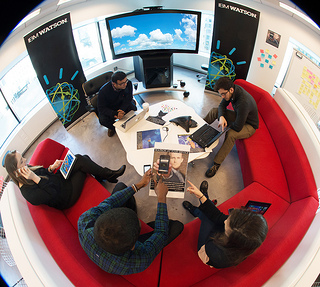Can computers dispense consulting advice? It depends...

Your next consultant may be a machine. However, when it comes to answering your questions, the machine is likely to respond, in true consulting style, "It depends." The system is likely to seek the context of your question, and serve up three, four or more possible answers that best match what it knows about your domain and interests. In the process, machines may be ready to help make high-level strategic decisions.

The cyber-consultant you or your CEO will be conferring with may likely be IBM's Watson, which will dig deep into its big data stores and provide a range of likely answers, in probabilistic fashion.
I recently had the opportunity to sit down with Michael Rhodin, senior vice president of IBM Watson Group, who described Watson's potential as a provider of advice and counsel to businesses of all types, from healthcare providers to call center operators.
Watson, now available through the cloud, dispenses answers in "probabilistic" fashion, Rhodin explains. "You’re making decisions based on patterns and probabilities as opposed to certainty, and the learning comes in when you make mistakes. We all learn as make mistakes. That's the way machinery and algorithms operate -- they get reinforcement, negative and positive, as they continue to evolve."
As with any consulting engagement, there is no right answer, but a series of well-considered choices. And this is how Watson operates as well, Rhodin says. "It's not a system that produces one right answer. What the system generates are many possible hypotheses. Then the machine learning algorithms decide how confident they are in each of the different hypothesis and rank them. It generates dozens of hypothesis with different confidence levels."
Featured
Again, mimicking human decision making, he adds. "When we're thinking about a question, we don’t always know the one answer. We usually think of the three or four. For most of us, even when we pick what we think is the best answer, we're not always 100-percent certain that it's the right answer -- but it's the best answer we can come up with." Circumstances change and data changes, he notes.
Watson is already being prototyped to serve as an on-site electronic consultant, as observed by Tom Simonite, writing in MIT Technology Review. Simonite describes how a Watson interface being tested at IBM's Cognitive Environments Lab. A well-wired meeting room, for example, can serve as Watson's listening station. "Everything said in the room can be instantly transcribed, providing a detailed record of any meeting, and allowing the system to listen out for commands addressed to 'Watson.' Those commands can be simple requests for information of the kind you might type into a search box. But Watson can also take a more active role in a discussion. In a live demonstration, it helped researchers role-playing as executives to generate a short list of companies to acquire."
This isn't just highly repeatable, low-level tasks either, Simonite relates. In the demonstration he witnessed Watson taking part in a high-level strategic acquisition decision:
"Watson was brought up to speed by being directed, verbally, to read over an internal memo summarizing the company’s strategy for artificial intelligence. It was then asked by one of the researchers to use that knowledge to generate a long list of candidate companies. 'Watson, show me companies between $15 million and $60 million in revenue relevant to that strategy,' he said. After the humans in the room talked over the results Watson displayed on screen, they called out a shorter list for Watson to put in a table with columns for key characteristics. After mulling some more, one of them said: 'Watson, make a suggestion.” The system ran a set of decision-making algorithms and bluntly delivered its verdict: 'I recommend eliminating Kawasaki Robotics.' When Watson was asked to explain, it simply added. 'It is inferior to Cognilytics in every way.'”
Artificial intelligence systems such as Watson may also serve to address more routine questions, such as those that come in from customers on a day-to-day basis. "With many of the systems we’ve automated over time, ecommerce sites and travel sites, we’ve lost the sales agent, we’ve lost the travel agent along the way," Rhodin points out. "Those travel agents were advisors, they had information to help us understand where we want to go, or what we want to buy."
AI may help restore some of these cognitive services that were abandoned with the web era, Rhodin believes. "These cognitive systems. could actually be advisors on the front end of these systems. You can have a conversation with the systems that helps you discover where you want to go, through dialogue. We think we can make that can work, to make the information systems we deal with much more accessible for the average human."